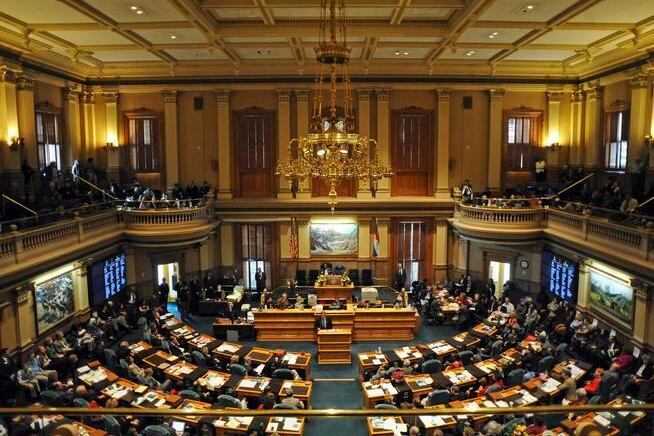Update: During a Thursday conference committee, lawmakers made several changes to the budget. Lawmakers reduced funding for a higher education chief equity officer to $125,000, halved funding for school bullying prevention programs to $1 million and cut funding for suicide prevention programs to $250,000. Lawmakers also removed an amendment that would have added funding for mental health screenings. The committee members retained an additional $10 million for special education programs.
After a marathon session Wednesday in which lawmakers debated more than 90 amendments, the Colorado House gave its initial approval to the state’s $34.1 billion spending bill for the 2022 fiscal year.
The state House will give final approval to the budget on Thursday before sending it back to the Joint Budget Committee, which has final say on the bill. The Senate approved the proposed 2021-22 budget last week.
Lawmakers heard 79 amendments filed by House members, mostly from Republicans, along with 14 amendments previously approved by the Senate.
Of the 79 House amendments, 15, all backed by Republicans, focused on K-12 education. They failed to gain traction in the Democratic-controlled chamber.
And of the five education-related Senate amendments, the House gave support to three. The amendments would add:
- $10 million for special education, bringing dedicated funding to $220 million, a 6.7% increase;
- $2 million for student mental health screenings;
- And $160,000 to create a chief equity officer position in the state higher ed department.
The House didn’t give its approval to Senate amendments that would have added money to school bullying and suicide prevention programs.
The Joint Budget Committee could still decide to include the Senate amendments that failed in the House. Joint Budget Committee Chair Sen. Dominick Moreno, a Commerce City Democrat, however, has said the committee will give more consideration to amendments approved by both chambers.
Overall, the proposed budget restores many cuts made last year in response to the pandemic, resulting in big increases for K-12 and higher education. Colorado has more money this year because lawmakers cut deeply last year, but tax revenues were better than expected. That allowed unspent money to be rolled over.
The proposed budget calls for $7.8 billion in spending on K-12 education, an 8.7% increase from 2020-21.
Lawmakers also plan to restore $494 million in state funding to higher education after pandemic cuts last year and want to send another $100.3 million more to support colleges and their students. In total, the proposed $1.2 billion for colleges and universities will almost double spending over this year.
Republicans argued their amendments would increase funds for key education priorities, such as restoring long-withheld funds and supporting literacy instruction.
Republicans filed numerous amendments that promised to pay down what’s called the budget stabilization factor. Colorado’s constitution requires that K-12 education funding increase every year based on population plus inflation. However, lawmakers withhold funding to pay for other budget priorities. This year, the budget stabilization factor is $572 million.
Republicans proposed completely eliminating the withholding and fully funding K-12 education by using the extra money rolled over from the 2020-21 budget.
“I think this is a great opportunity for us to get to a good place and just pay the thing off,” said state Rep. Dave Williams, a Colorado Springs Republican who sponsored several amendments focused on the budget stabilization factor.
But Democrats argued only recurring funds should be used to make up the difference in education funding. Otherwise, funding might be restored this year only to be cut again next year.
And budget committee members have said they want excess funds to be placed into reserves in case of long-term fallout from the pandemic.
Joint Budget Committee Vice Chair Rep. Julie McCluskie, a Dillon Democrat, said the amendments wouldn’t be fiscally responsible.
“Do I hope we find an ongoing funding stream for our public schools? You’re darn right,” she said. “We need to make that happen. It has to be a priority for the state and we’ve put it off for far too long. But spending this money today is not fiscally sound.”





